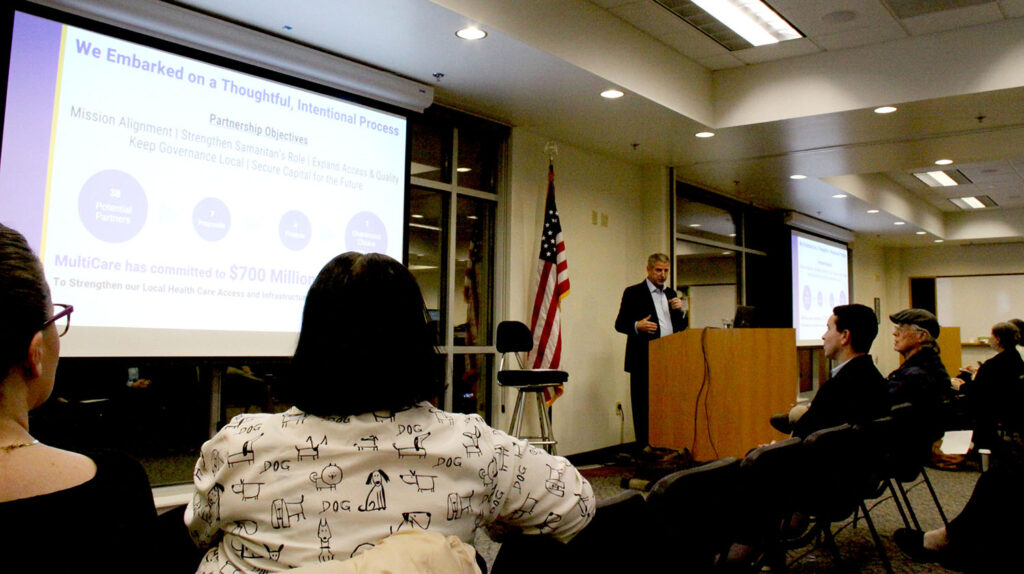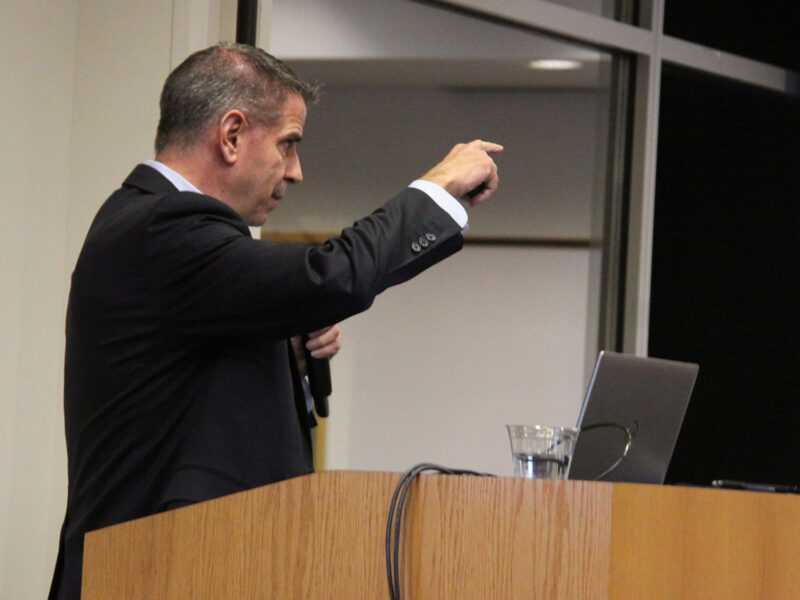Samaritan Health CEO Marty Cahill kicked off a series of town halls, focusing on Samaritan’s planned merger with Tacoma, Wash.-based MultiCare health system, on Wednesday evening, Nov. 12, at Samaritan Lebanon Community Hospital.
Speaking to about 100 people in the hospital conference room, Cahill explained reasons behind the merger and provided an overview of MultiCare and its interest in joining with Samaritan.
Samaritan reported Thursday, Nov. 13, that town halls scheduled in Albany and Corvallis have been filled, so it is scheduling another from 5:30 to 6:30 p.m. Tuesday, Nov. 25, at Boulder Falls Inn Event Center, 605 Mullins Drive, Lebanon. Registration is required, and seating is limited. To register or learn more, visit samhealth.org/Affiliation.
Also, a virtual forum with Cahill is scheduled for noon to 1 p.m. Thursday, Dec. 11. A link will be provided upon registration and a recording will be available at samhealth.org/Affiliation after the event.
At the Nov. 12 town hall, Cahill recounted the deliberative process through which Samaritan and MultiCare came together, saying Samaritan’s Board of Directors and administrators hired Juniper Consulting Group to identify potential partners for a possible merger.
He said Juniper received responses from 18 organizations that signed non-disclosure agreements to learn more about the opportunity, which led to seven proposals that were narrowed down to four, then two finalists, and finally, MultiCare.
“This wasn’t a fire sale,” he said. “We were viewed as a very good strategic partner in this state.”
After visiting with board members and leadership of the two finalists, he said Samaritan board members unanimously selected MultiCare.

Introducing MultiCare
MultiCare’s history dates back to 1882 with the establishment of Tacoma’s first hospital, and it has since grown since 1980 into the largest community-based, locally governed health system in Washington state. The organization operates more than 300 primary, urgent, pediatric and specialty care locations across Washington and Idaho and – with the addition of Samaritan – Oregon, as well as 13 hospitals totaling 2,926 beds, staffed by 25,000-plus employees and more than 2,300 clinicians.
Ten of its hospitals offer acute care and two are behavioral health facilities. MultiCare’s services include neurology care, same-day surgery, retail imagery services, and is about to open a new children’s hospital in Tacoma, none of which are offered by Samaritan, Cahill said.
 Also, according to its tax filings in recent years, MultiCare has been profitable every year during the period of 2011 through 2023, during which Samaritan as a whole has finished in the red, financially, in 2021-2023, 2016 and 2014, and profits have been seven figures or less in five other years during the 2011-23 timespan.
Also, according to its tax filings in recent years, MultiCare has been profitable every year during the period of 2011 through 2023, during which Samaritan as a whole has finished in the red, financially, in 2021-2023, 2016 and 2014, and profits have been seven figures or less in five other years during the 2011-23 timespan.
Cahill attributed that to smart planning and investing by MultiCare: “All the things they do are the right fits for MultiCare, their community,” he said. “They just have tools and technology and investments through which they’ve been able to gain great efficiencies in their hospitals, in the partnerships they’ve done.”
He said MultiCare has a “significant treasury because they’ve been successful.”
“They’ve done a very good job. They’re very disciplined with their investment strategy. There are things we can learn from them.”
For MultiCare, Samaritan’s health plan was of high interest, Cahill said, and it operates a hospice, which MultiCare lacks.
The health plan component was critical to MultiCare’s interest, he said.
“‘If the healthcare plans go away, we’re not interested’ – that’s how valuable they are.”
Another positive that Samaritan brings to the table is that it is an “employer of choice” in the region, he said.
“We have people with 10, 15, 20, 30, 40 years of service and they liked that.”
Benefits for Samaritan
Paperwork to begin the process of merging was filed earlier this month.
The merger agreement, which is expected to be completed by the middle of next year, includes a commitment of $700 million over 10 years from MultiCare, which would assume ownership of Samaritan’s assets. When the merger is complete, Samaritan will have one seat on MultiCare’s Board of Directors, which will bring the number of board members to 13.
 Cahill said Samaritan leaders hope the cash influx will fund a new wing for Good Samaritan Regional Medical Center in Corvallis and possible upgrades to the “very small” emergency room at Albany General Hospital.
Cahill said Samaritan leaders hope the cash influx will fund a new wing for Good Samaritan Regional Medical Center in Corvallis and possible upgrades to the “very small” emergency room at Albany General Hospital.
Plus, he said, MultiCare has experience in creating medical facilities that Samaritan has not: free-standing emergency rooms, ambulatory services such as same-day surgery and retail imaging centers. He noted that the organization has established Indigo walk-in urgent care clinics throughout Washington and northern Idaho, and could do the same in Samaritan’s territory.
County Commissioner Roger Nyquist asked how the merger might affect Samaritan in its abilities to recruit medical practitioners – doctors, nurses, physician assistants and others.
Cahill noted that those vacancies have largely been created by retirements, though he acknowledged that because many young doctors now work for large corporations rather than small practices, it’s easier to move to perceived greener pastures.
Cahill said medical schools are not producing enough new doctors and nurses to fill the void, which makes recruiting such professionals even more difficult, particularly in a rural region.
MultiCare intends to bring in more primary care and specialty care doctors, Larissa Balzar, Samaritan’s vice president of strategy and planning, interjected. She noted that it had added 60 physicians at Yakima Memorial Hospital, with which it merged in 2023, “which really had been struggling before that.”
“We believe they will help in recruiting,” Cahill said. “They have a secret sauce in hiring folks.”
He also said that Samaritan’s name will likely remain on its facilities, though MultiCare’s could appear as well.
“It’s wildly expensive to change signs,” he said.
Also, there will be no changes in 2026 to insurance plans currently accepted at Samaritan facilities, he and Balzar said. More information about health insurance is available at samhealth.org/InsuranceBilling.
‘Cultural Alignment’
Cahill said there is “cultural alignment” between the two – “similar philosophies.”
Like Samaritan, MultiCare is a 501(c)(3) nonprofit. Cahill said the organization operates on four “pillars” which, he said, govern all the decisions its board makes:
- A moral obligation to deliver best health system possible;
- Local governance and decision-making;
- Trust within the community; and
- Cultural transformation to become customer- and community-centric.
“They say it a little differently, but that’s exactly who we are,” Cahill said. “That resonated with us. When you look at what people do, where the money’s spent, you can see what’s important to them.”
He said MultiCare uses a “win-win-win” philosophy to determine its courses of action: “success for patients, success for both partners, success for MultiCare.”
MultiCare’s goal, he said, is to serve one-third of the population of the Northwest, and it is moving into southern Idaho as well as Oregon, which is another reason why it is interested in merging with Samaritan.
Samaritan’s location in the Willamette Valley and its assets give MultiCare a chance to make a splash in Oregon, he said.
“That’s a position of strength. They chose us for a reason. When you look at the Willamette Valley, we will be a foundation for MultiCare moving forward.
“I think size makes a difference in healthcare today and they have tools that I think can really help us.”
He used a sports analogy to explain why Samaritan decided to make a move, citing the example of the Pac12 conference, which underwent a major membership realignment in 2024 when four members – Oregon, Washington, UCLA and USC – bolted to the Big 12 when the Pac12’s media rights deal expired.
“Teams had choices and opportunity, but if you waited too long and the music stopped, that was gone.”
Samaritan’s senior leadership viewed a merger with MultiCare as “a win-win-win for us,” he said.
“MultiCare’s strongest capabilities match Samaritan’s needs.”
For additional information on the merger, visit samhealth.org/Affiliation.





